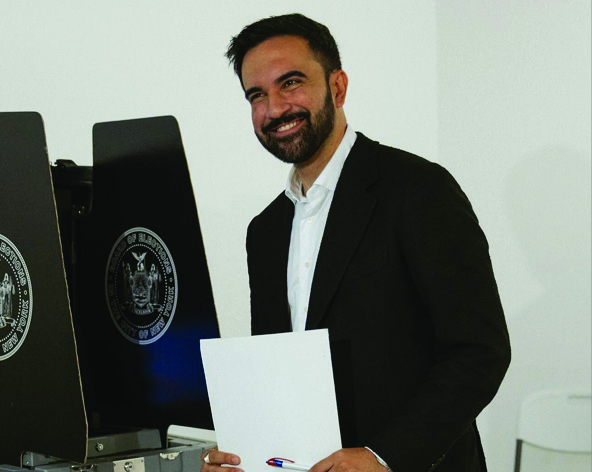
Zohran Mamdani’s Path to the Mayoralty: A Political Earthquake in New York City
Jafar Bhamji
6-25-2025
 Email
to a friend Email
to a friend
 Post
a comment Post
a comment
 Print Print
In one of the most consequential political upsets in New York City's history, 33-year-old democratic socialist Zohran Mamdani has declared victory in the Democratic primary for mayor, placing him on the cusp of becoming the city’s first Muslim and Indian-American mayor. Though not yet the official nominee due to New York's ranked-choice voting system, Mamdani’s lead marks a historic shift in the city’s political landscape — and potentially the Democratic Party’s future direction.
From Uganda to New York: Mamdani’s Background
Born in Uganda to Indian parents, Mamdani immigrated to New York City at age 7. He is the son of the acclaimed filmmaker Mira Nair and has cultivated a political identity rooted in his multicultural experience, social activism, and progressive values. Elected to the New York State Assembly in 2020, Mamdani gained recognition as a bold, left-wing voice focused on housing, transportation, and economic justice.
A Stunning Victory — But Not a Mayoral Win Yet
Mamdani declared victory Tuesday night after preliminary results showed he had secured 43.5% of the vote in the Democratic primary, compared to Andrew Cuomo’s 36.4%. Despite this lead, Mamdani has not yet clinched the nomination outright because of New York City’s ranked-choice voting (RCV) system. In this system, voters rank up to five candidates by preference. If no one receives more than 50% of the vote in the first round, votes are redistributed based on subsequent preferences until one candidate crosses the 50% threshold.
Mamdani cross-endorsed progressive Brad Lander, who came in third with 11.4%, and is expected to benefit from Lander’s supporters in later rounds of vote counting. Full results are expected by July 1.
Why Mamdani’s Primary Win Matters
This race is more than just a local election — it’s become a national bellwether for the direction of the Democratic Party. Mamdani, endorsed by Alexandria Ocasio-Cortez and Bernie Sanders, represents a younger, progressive wing of the party focused on economic justice and fighting establishment politics. His opponent, Andrew Cuomo, is a well-known centrist and former three-term governor who resigned in disgrace in 2021 amid sexual harassment allegations.
Cuomo entered the race as the presumed frontrunner, bolstered by $25 million in super PAC support, the backing of Bill Clinton, and widespread name recognition. Mamdani’s grassroots movement, however, energized by more than 50,000 volunteers, surged past the establishment favorite — signaling a seismic shift in what Democratic voters, particularly younger and more diverse ones, are demanding.
The Ranked-Choice Voting System Explained
RCV was first used in New York’s 2021 elections and allows voters to rank candidates in order of preference. If no candidate wins a majority outright, the one with the fewest votes is eliminated, and those votes are redistributed based on second choices. The process continues until one candidate secures more than 50%.
This method encourages coalition-building — something Mamdani embraced by allying with other progressives. It also rewards candidates who appeal to a broader base, not just those who finish first in the initial tally.
.jpg)
Mamdani’s Bold Progressive Agenda
Mamdani’s campaign has centered on making New York more affordable and equitable. His flagship proposals include:
Free public buses citywide
Universal childcare
City-run grocery stores
Rent freezes on subsidized housing units
Tax increases on the wealthy to fund expanded public services
He has also drawn attention for his strong support of Palestinian rights, placing him at odds with pro-Israel groups and parts of the Democratic establishment in a city with a large Jewish population.
Mamdani's messaging — emphasizing struggle, hope, and solidarity — resonated particularly with young, working-class, and immigrant communities, helping him sweep Latino and South Asian neighborhoods and surpass Cuomo even in some traditionally moderate areas.
What’s Next?
Though Mamdani appears poised to become the Democratic nominee, the general election in November is expected to be a contentious battle. Incumbent mayor Eric Adams is running as an independent, facing low approval ratings and recently dropped corruption charges. Cuomo, despite conceding the primary, has also secured a spot on the independent ballot line and has not ruled out continuing his campaign.
Mamdani, if elected, would be the youngest mayor of New York City in over a century — and the first to lead as a democratic socialist. He would also inherit the complexities of managing a city of over 8 million people, 300,000 public workers, and an entrenched political and business establishment that has already begun mobilizing against him.
Still, Mamdani remains undeterred.
“We were never in this for a moral victory,” he told supporters. “This campaign is going to win — and it’s thanks to each of you.”
Whether or not he becomes the city’s 111th mayor, Zohran Mamdani’s primary win is already a turning point — not just for New York, but for the future of progressive politics in America.
|